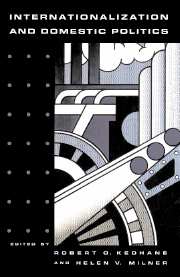Book contents
- Frontmatter
- Contents
- Preface
- Contributors
- PART I Theoretical Framework
- PART II The Industrialized Democracies
- PART III Internationalization and Socialism
- PART IV International Economic Crisis and Developing Countries
- PART V Conclusion
- 10 Internationalization and Domestic Politics: A Conclusion
- Notes
- References
- Index
10 - Internationalization and Domestic Politics: A Conclusion
Published online by Cambridge University Press: 20 March 2010
- Frontmatter
- Contents
- Preface
- Contributors
- PART I Theoretical Framework
- PART II The Industrialized Democracies
- PART III Internationalization and Socialism
- PART IV International Economic Crisis and Developing Countries
- PART V Conclusion
- 10 Internationalization and Domestic Politics: A Conclusion
- Notes
- References
- Index
Summary
In this conclusion we seek to answer the questions raised in our introduction in light of the evidence in the empirical chapters. We proceed by elaborating the causal mechanisms, or pathways, linking internationalization to domestic politics that were suggested in the introduction, then assessing the hypotheses put forward there. Our intention is systematically to summarize what we have learned about the impact of internationalization on group interests, government policy and domestic institutions, as well as to explore some of the impacts of such institutions on internationalization itself.
We first explicate three specific pathways by which changes in the world economy can alter domestic politics: by creating new policy preferences and coalitions, by triggering domestic economic and political crises, and by undermining government control over macroeconomic policy. This discussion refers directly to Section III of the introduction, focusing on the broad coalitional processes discussed there and on propositions 1 and 2. The second part of this conclusion seeks to answer the questions put forth in corollaries 1 and 2 of the introduction: Are autarchic countries also affected? Who wins and who loses from internationalization? Our third section assesses the three effects of domestic institutions that were identified in Section IV of the introduction: blocking international price signals, freezing domestic coalitions, and channeling political responses to price changes. In few cases were domestic institutions able completely to block international price signals, but they have often mediated those signals and have slowed down the process of change.
- Type
- Chapter
- Information
- Internationalization and Domestic Politics , pp. 243 - 258Publisher: Cambridge University PressPrint publication year: 1996
- 10
- Cited by

